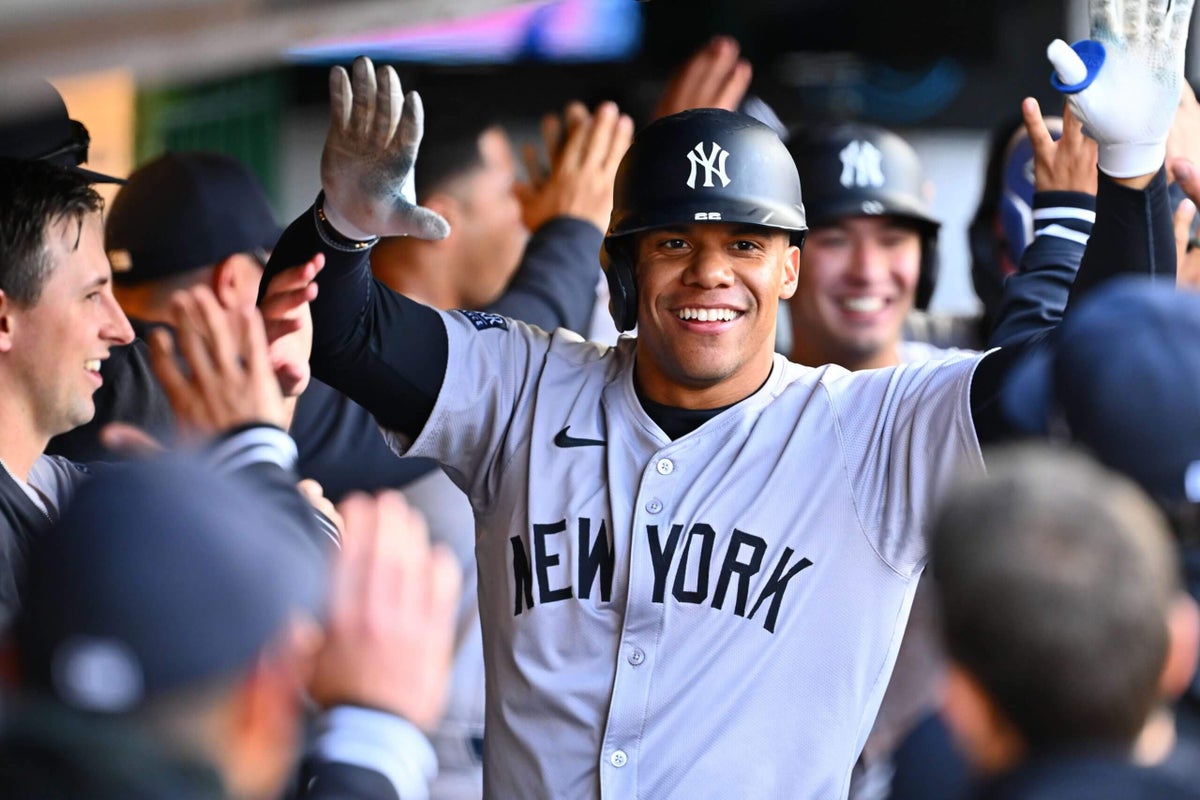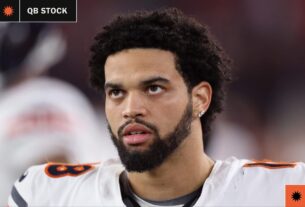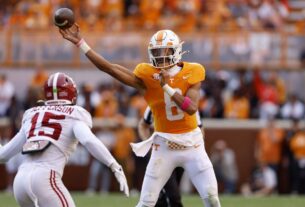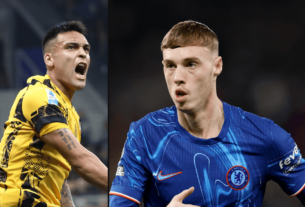When Michael Bluth charged his own brother, Gob, for a Bluth frozen banana in a season one episode of “Arrested Development,” his mother Lucille chided him.
“I mean it’s one banana, Michael. What could it cost: $10?”
“You’ve never actually set foot in a supermarket, have you?”
I think of that line a lot this time of year, though to be fair, I think of that line a lot any time of year. But early in the offseason, every fan wants a short-term hometown discount, every team wants flexibility and sustainability, and every player wants $50 million more than you expected.
What does a banana cost in free agency these days?
This is the third winter I’m projecting MLB free-agent contracts for The Athletic. I’ve got a big Excel spreadsheet with a bunch of free-agent and extension contracts in it (mostly from the last decade, but some landmark contracts from earlier), as well as players’ performance in the years leading up to those contracts, as defined by FanGraphs’ wins above replacement. Whereas players get paid off home runs and saves in arbitration, I’ve found fWAR to be a solid (though not all-knowing) predictor of earnings on the open market. When I use WAR in this story, it’s referring to FanGraphs’ version of it.
I plug impending free agents into the spreadsheet, find players with similar levels of production before they signed their deals, and work off of those comps. Several points worth noting:
- I used to look at fWAR in samples from each of the last five seasons. Now I concentrate heavily on the most recent season and the combined production over the last three for starting pitchers and position players.
- For relievers, I look at one- and two-year samples. What happened five years ago isn’t really relevant for such a volatile position, and I’ve found more of a recency bias in contracts here than elsewhere.
- I’ve used the U.S. Bureau of Labor’s inflation calculator to translate contracts into “today’s money,” though I define “today” as the start of 2024.
- There remains a decent amount of subjective judgment that goes into creating the comparisons, and factors beyond fWAR play into that.
- These are not necessarily deals I’d advocate the player sign or the team sign the player to. I’m trying to peg fair value.
- The values I’m proposing here are in present-day money. It’s possible players here sign for amounts that look larger before deferrals bring it back down (i.e., Shohei Ohtani last winter).

Will Corbin Burnes get Aaron Nola-type money this offseason? (Duane Burleson / Getty Images)
Juan Soto
Fall projection: 12 years, $540 million
I went in-depth on Soto in early September. One thing I got wrong in that analysis is that, while Ohtani’s deferred deal with the Dodgers is valued at around $437.8 million in the present day, his average annual value is calculated at just over $46 million per season. So that’s the target for Soto.
|
Player
|
Signed
|
Ages
|
fWAR1
|
fWAR3
|
fWAR5
|
Years
|
Total
|
2024 AAV
|
|---|---|---|---|---|---|---|---|---|
|
2008 |
32-41 |
9.6 |
22.5 |
38.3 |
10 |
275.0 |
40.2 |
|
|
2001 |
25-34 |
9.5 |
22.1 |
35.6 |
10 |
252.0 |
44.9 |
|
|
2024 |
29 |
8.9 |
26.4 |
30.9 |
10 |
437.8 |
46.1 |
|
|
2025 |
26 |
8.1 |
17.9 |
31.0 |
We saw just last winter what a bidding war involving the Yankees, Dodgers and Mets could do to drive up the price for Yoshinobu Yamamoto. With Soto, the Giants, Blue Jays and Phillies could get involved as well. One of those teams is going to go to at least 13 years at a record AAV.
Projection: 13 years, $611 million
Corbin Burnes
Spring projection: 7 years, $245 million
Burnes is hitting free agency after a second solid if not quite spectacular season, and he’s now three years removed from his best year, when he won the Cy Young Award in 2021 and posted more than seven wins above replacement. His peer group has thus dropped from the Max Scherzers and Stephen Strasburgs to the likes of Aaron Nola and Jon Lester — which, to be clear, is still a financially lucrative cohort.
|
Player
|
Signed
|
Ages
|
fWAR1
|
fWAR3
|
fWAR5
|
Years
|
Total
|
2024 AAV
|
|---|---|---|---|---|---|---|---|---|
|
2015 |
31-36 |
5.6 |
11.6 |
19.1 |
6 |
155.0 |
34.4 |
|
|
2024 |
31-37 |
3.9 |
14.6 |
22.6 |
7 |
172.0 |
24.6 |
|
|
2025 |
30 |
3.7 |
11.8 |
24.2 |
Burnes is a year younger than both Nola and Lester were entering free agency, and he hadn’t experienced the real down seasons that both had encountered. I pegged Nola last year as a $30 million per year pitcher before he signed his deal with Philadelphia, and I view Burnes just slightly ahead of that at $31 million.
Projection: 7 years, $217 million
Alex Bregman
Spring projection: 6 years, $180 million
Bregman bounced back from a brutal start to the season to more or less look like himself for much of the year, aside from a curious and significant drop in his walk rate. Matt Chapman’s recent deal with the Giants sets the floor for Bregman going forward, with Rafael Devers’ extension with the Red Sox operating as the ceiling.
|
Player
|
Signed
|
Ages
|
fWAR1
|
fWAR3
|
fWAR5
|
Years
|
Total
|
2024 AAV
|
|---|---|---|---|---|---|---|---|---|
|
2025 |
32-37 |
5.4 |
12.3 |
19.8 |
6 |
150.0 |
25.0 |
|
|
2025 |
31 |
4.1 |
14.0 |
20.5 |
||||
|
2023 |
27-36 |
4.9 |
12.9 |
20.6 |
10 |
291.5 |
30.0 |
The big difference here is that Bregman is four years older than Devers, so a contract here covers much less of his prime. That leaves his AAV down closer to Chapman’s, at $27 million.
Projection: 7 years, $189 million
Max Fried
Spring projection: 6 years, $180 million
Fried looks quite a bit like Nola as well, plying his trade effectively in the National League East while consistently on the periphery of Cy Young Award consideration. Jordan Zimmermann (last decade) and Kevin Gausman (this decade) are helpful, too.
|
Player
|
Signed
|
Ages
|
fWAR1
|
fWAR3
|
fWAR5
|
Years
|
Total
|
2024 AAV
|
|---|---|---|---|---|---|---|---|---|
|
2024 |
31-37 |
3.9 |
14.6 |
22.6 |
7 |
172.0 |
24.6 |
|
|
2022 |
31-35 |
4.8 |
10.1 |
15.0 |
5 |
110.0 |
25.5 |
|
|
2016 |
30-34 |
3.0 |
12.0 |
18.7 |
5 |
110.0 |
28.8 |
|
|
2025 |
31 |
3.4 |
10.1 |
17.6 |
||||
|
2010 |
31-35 |
3.3 |
9.6 |
20.2 |
5 |
82.5 |
23.9 |
This sets a narrow range of $25 million to $29 million per season for Fried. Let’s go toward the high end of that for five years.
Projection: 5 years, $140 million
Willy Adames
Spring projection: 5 years, $120 million
Like Soto and unlike most other position players on this list, Adames is coming off arguably the best season of his career. The comps for him have pretty consistently been Trevor Story and Javier Báez; in the past, he looked just shy of their production. Now he’s on par with it.
|
Player
|
Signed
|
Ages
|
fWAR1
|
fWAR3
|
fWAR5
|
Years
|
Total
|
2024 AAV
|
|---|---|---|---|---|---|---|---|---|
|
2023 |
29-35 |
6.3 |
14.0 |
17.6 |
7 |
177.0 |
26.0 |
|
|
2025 |
29 |
4.7 |
12.5 |
18.8 |
||||
|
2022 |
29-34 |
4.0 |
13.2 |
22.3 |
6 |
140.0 |
25.2 |
|
|
2022 |
29-34 |
2.8 |
14.2 |
20.7 |
6 |
140.0 |
25.2 |
He still doesn’t quite get to Dansby Swanson’s deal because his defense isn’t as sure a thing moving forward.
Projection: 6 years, $150 million
Blake Snell
Snell has a chance to, like Matt Chapman, win out in the long run. I projected a five-year, $135 million deal for him last winter, and instead he settled for two years and $62 million from the Giants with this opt-out. After another very strong second half, he compares pretty well to himself from a year ago, as well as some other pitchers who earned higher AAVs in shorter terms.
|
Player
|
Signed
|
Ages
|
fWAR1
|
fWAR3
|
fWAR5
|
Years
|
Total
|
2024 AAV
|
|---|---|---|---|---|---|---|---|---|
|
2024 |
31-32 |
4.1 |
9.8 |
14.5 |
2 |
62.0 |
31.0 |
|
|
2015 |
33-36 |
3.2 |
11.4 |
17.9 |
4 |
75.0 |
24.9 |
|
|
2025 |
32 |
3.1 |
10.8 |
15.0 |
||||
|
2022 |
31-33 |
3.4 |
9.1 |
13.9 |
3 |
71.0 |
27.5 |
Since Snell’s entering his age-32 season, let’s chop a year off last year’s projection and add ever so slightly to the AAV, in line with Stroman’s deal.
Projection: 4 years, $110 million
Jack Flaherty
Flaherty’s one-year bet on himself last winter should pay off big-time. He submitted his best season since 2019 and essentially served as the No. 1 starter for the World Series champion in the postseason. And, because he only signed for one year, he’s a free agent again entering his age-29 season — younger than any other starter in the class.
When teams splurge more than you expect for a starter, it’s often one with a pedigree like Flaherty’s at a relatively young age. You can see that in the comps here:
|
Player
|
Signed
|
Ages
|
fWAR1
|
fWAR3
|
fWAR5
|
Years
|
Total
|
2024 AAV
|
|---|---|---|---|---|---|---|---|---|
|
2020 |
30-34 |
4.7 |
9.1 |
9.1 |
5 |
118.0 |
28.8 |
|
|
2016 |
31-35 |
2.5 |
9.3 |
12.6 |
5 |
90.0 |
23.6 |
|
|
2025 |
29 |
3.2 |
5.0 |
8.1 |
||||
|
2016 |
28-32 |
1.6 |
5.9 |
8.8 |
5 |
80.0 |
21.0 |
While Flaherty’s peripherals are strong, they don’t jump off the page the way Wheeler’s did five years ago. But a long-term deal at more than Leake’s present-day money should be on the table.
Projection: 4 years, $92 million
Anthony Santander
Teoscar Hernández
Let’s group two power-hitting corner outfielders.
|
Player
|
Signed
|
Ages
|
fWAR1
|
fWAR3
|
fWAR5
|
Years
|
Total
|
2024 AAV
|
|---|---|---|---|---|---|---|---|---|
|
2025 |
32 |
3.5 |
8.3 |
15.5 |
||||
|
2022 |
30-34 |
3.5 |
8.0 |
11.7 |
5 |
100.0 |
21.6 |
|
|
2025 |
30 |
3.3 |
8.3 |
9.8 |
||||
|
2022 |
29-32 |
2.8 |
6.6 |
10.2 |
4 |
79.0 |
21.3 |
Nick Castellanos’ deal with the Phillies is one a lot of corner outfielders should like: It sets a solid floor for non-superstars at the position.
Hernández’s age limits how many years he’ll get, but he should get the highest AAV out of this group. Coming off his best season, Santander has a strong chance to crack five years and nine figures.
Projection for Santander: 5 years, $105 million
Projection for Hernández: 3 years, $69 million
Pete Alonso
Spring projection: 6 years, $168 million
After a subpar platform season, Alonso is pretty firmly a tier below the elite earners at first base.
|
Player
|
Signed
|
Ages
|
fWAR1
|
fWAR3
|
fWAR5
|
Years
|
Total
|
2024 AAV
|
|---|---|---|---|---|---|---|---|---|
|
2019 |
31-35 |
5.2 |
15.4 |
26.9 |
5 |
130.0 |
32.0 |
|
|
2022 |
32-37 |
4.9 |
15.8 |
25.2 |
6 |
162.0 |
29.2 |
|
|
2016 |
30-36 |
5.4 |
13.4 |
14.7 |
7 |
161.0 |
30.1 |
|
|
2022 |
28-35 |
5.1 |
12.3 |
17.7 |
8 |
168.0 |
22.7 |
|
|
2025 |
30 |
2.1 |
8.8 |
15.0 |
He can at least argue he’s got a longer and better track record than Chris Davis had at the time of his deal, which would be worth $30 million annually in today’s money. Alonso will probably have to balance going for a longer-term deal at a more modest AAV versus a short-term one that pays him better per year. Sacrificing anything beyond a fifth season should allow him to approach the AAVs for some of those players above him in the table.
Projection: 5 years, $140 million
Tanner Scott
Scott doesn’t have the potential Hall of Fame track record or the big-game bona fides of most of the closers who have earned the biggest deals in free agency. By reputation and performance, that leaves Raisel Iglesias as his best comp.
|
Player
|
Signed
|
Ages
|
fWAR1
|
fWAR2
|
Years
|
Total
|
2024 AAV
|
|---|---|---|---|---|---|---|---|
|
2022 |
32-35 |
2.0 |
5.0 |
4 |
58.0 |
15.7 |
|
|
2020 |
31-33 |
2.1 |
3.9 |
3 |
48.0 |
19.5 |
|
|
2025 |
30 |
1.6 |
4.5 |
||||
|
2019 |
31-33 |
1.3 |
4.5 |
3 |
43.0 |
17.6 |
Projection: 4 years, $64 million
We’re entering the veteran second tier of starting pitchers, all of whom have been free agents before (and recently) and all of whom are coming off strong seasons.
Thanks to midseason mechanical changes and a really strong finishing kick, Manaea probably has the best chance out of this group to earn a fourth year, basically getting close to Eduardo Rodriguez’s deal with Arizona last year.
|
Player
|
Signed
|
Ages
|
fWAR1
|
fWAR3
|
fWAR5
|
Years
|
Total
|
2024 AAV
|
|---|---|---|---|---|---|---|---|---|
|
2024 |
31-34 |
3.0 |
7.6 |
13.3 |
4 |
80.0 |
20.0 |
|
|
2023 |
34-36 |
2.7 |
9.0 |
11.3 |
3 |
63.0 |
21.6 |
|
|
2016 |
32-34 |
2.3 |
8.3 |
8.1 |
3 |
48.0 |
21.0 |
|
|
2025 |
33 |
2.8 |
5.0 |
10.7 |
Projection: 4 years, $76 million
Yusei Kikuchi
The Astros sacrificed more than expected at the deadline because they thought Kikuchi’s results weren’t indicative of how he was pitching. They were largely rewarded for that view down the stretch, when he was terrific over 10 starts for Houston. Bassitt and Ryu, a pair of former teammates in Toronto, are the comps.
|
Player
|
Signed
|
Ages
|
fWAR1
|
fWAR3
|
fWAR5
|
Years
|
Total
|
2024 AAV
|
|---|---|---|---|---|---|---|---|---|
|
2020 |
33-36 |
4.9 |
7.4 |
7.4 |
4 |
80.0 |
24.4 |
|
|
2023 |
34-36 |
2.7 |
9.0 |
11.3 |
3 |
63.0 |
21.6 |
|
|
2025 |
34 |
3.5 |
5.1 |
7.9 |
||||
|
2019 |
35-36 |
3.1 |
6.7 |
9.3 |
2 |
30.0 |
18.5 |
Projection: 3 years, $63 million
An inconsistent platform season in 2022 limited Eovaldi’s last deal to two years and $34 million. He should do better this time around, as he’s the precise kind of pitcher contenders love to have in their rotation.
|
Player
|
Signed
|
Ages
|
fWAR1
|
fWAR3
|
fWAR5
|
Years
|
Total
|
2024 AAV
|
|---|---|---|---|---|---|---|---|---|
|
2019 |
36-37 |
3.0 |
8.7 |
13.1 |
2 |
34.0 |
20.9 |
|
|
2025 |
35 |
2.7 |
6.1 |
14.4 |
||||
|
2020 |
32-34 |
0.8 |
6.3 |
14.4 |
3 |
55.5 |
22.6 |
Projection: 2 years, $45 million
Jurickson Profar
Two winters ago, I viewed Profar and Andrew Benintendi in the same bucket as decent corner outfielders who lacked power and hadn’t consistently lived up to their prospect pedigrees. Benintendi signed for five years and $75 million with the White Sox, and Profar for one year and $7 million with the Rockies, who released him during the season.
Now, Profar’s closest comp isn’t a fellow outfielder but another player who submitted an unexpectedly excellent season at 31.
|
Player
|
Signed
|
Ages
|
fWAR1
|
fWAR3
|
fWAR5
|
Years
|
Total
|
2024 AAV
|
|---|---|---|---|---|---|---|---|---|
|
2018 |
32-34 |
4.3 |
6.0 |
8.9 |
3 |
38.0 |
16.0 |
|
|
2025 |
32 |
4.3 |
5.1 |
6.3 |
Let’s just update those terms to today’s cash, which hey, would just beat out what Benintendi has left on his deal.
Projection: 3 years, $48 million
Christian Walker
Spring projection: 2 years, $37 million
Finally hitting free agency ahead of his age-34 season, Walker’s peers, even some a year or two younger, all signed shorter-term deals.
|
Player
|
Signed
|
Ages
|
fWAR1
|
fWAR3
|
fWAR5
|
Years
|
Total
|
2024 AAV
|
|---|---|---|---|---|---|---|---|---|
|
2023 |
36-38 |
3.9 |
11.3 |
14.5 |
3 |
58.5 |
20.1 |
|
|
2025 |
34 |
3.0 |
10.8 |
13.0 |
||||
|
2014 |
32-33 |
3.4 |
8.1 |
12.4 |
2 |
32.0 |
21.3 |
|
|
2018 |
32-34 |
3.1 |
8.4 |
13.0 |
3 |
60.0 |
25.2 |
|
|
2022 |
31-32 |
2.1 |
8.6 |
16.2 |
2 |
32.0 |
17.3 |
|
|
2023 |
32-33 |
2.4 |
7.3 |
14.3 |
2 |
40.0 |
20.6 |
|
|
2020 |
33-35 |
1.6 |
7.7 |
12.9 |
3 |
50.0 |
20.3 |
The market for Walker might end up more robust than that for Alonso, given the lack of long-term commitment. That should push him out in front of most of his comps in AAV.
Projection: 2 years, $44 million
Ha-seong Kim
Spring projection: 4 years, $72 million
Kim’s status is complicated by the shoulder surgery he underwent late in the season. Thus, a model for his next deal could be the one Rhys Hoskins signed with the Brewers last winter: a two-year pact with a player opt-out after the first season.
Kim’s value as a second-tier shortstop aligns well with someone like Jhonny Peralta.
|
Player
|
Signed
|
Ages
|
fWAR1
|
fWAR3
|
fWAR5
|
Years
|
Total
|
2024 AAV
|
|---|---|---|---|---|---|---|---|---|
|
2014 |
32-35 |
3.6 |
10.4 |
12.5 |
4 |
53.0 |
17.6 |
|
|
2025 |
29 |
2.6 |
10.5 |
10.9 |
Projection: 2 years, $36 million
Jeff Hoffman
Hoffman’s lack of closing experience — and his difficult postseason — probably prevent him from getting the big money that his recent performance might otherwise have earned. Non-closing relievers have been capped right around $11 million per season; Hoffman’s been good enough to push that mark forward, marginally.
|
Player
|
Signed
|
Ages
|
fWAR1
|
fWAR2
|
Years
|
Total
|
2024 AAV
|
|---|---|---|---|---|---|---|---|
|
2025 |
32 |
2.0 |
3.6 |
||||
|
2019 |
29-31 |
1.8 |
2.1 |
3 |
30 |
12.3 |
|
|
2019 |
33-35 |
1.9 |
1.8 |
3 |
27 |
11.1 |
|
|
2023 |
31-33 |
1.5 |
1.8 |
3 |
34.5 |
11.8 |
|
|
2024 |
31-33 |
0.9 |
1.2 |
3 |
33 |
11.0 |
Projection: 3 years, $36 million
Walker Buehler
Here are Buehler’s comps by WAR.
|
Player
|
Signed
|
Ages
|
fWAR1
|
fWAR3
|
fWAR5
|
Years
|
Total
|
2024 AAV
|
|---|---|---|---|---|---|---|---|---|
|
2021 |
29 |
0.0 |
1.0 |
7.1 |
1 |
3.0 |
3.5 |
|
|
2022 |
31 |
0.0 |
2.0 |
2.2 |
1 |
7.0 |
8.1 |
|
|
2025 |
30 |
-0.2 |
0.8 |
9.9 |
||||
|
2023 |
30- |
0.0 |
1.9 |
2.3 |
1 |
Minors |
N/A |
|
|
2022 |
35 |
-0.2 |
1.4 |
6.3 |
N/A |
N/A |
N/A |
He’s going to do better than them.
Maybe nobody did more to help his stock in free agency during the postseason than Buehler, who after one bad inning in the NLDS shoved in the NLCS and World Series, including in the season’s final inning. The competitiveness is beyond reproach; the issue is whether Buehler can relocate the stuff he had before his second Tommy John surgery.
Frankie Montas ($16 million) and Luis Severino ($13 million) set the mark for one-year starting pitcher pillow contracts last season. Buehler’s postseason success probably means he’s not limited to that kind of offer — though my guess is any multiyear deal would come with an opt-out after the first season to maximize earnings if Buehler has a full bounceback season. A two-year deal would probably be frontloaded as well for that reason.
Projection: 2 years, $32 million
Other projections
Luis Severino: 3 years, $50 million
Nick Pivetta: 3 years, $48 million
Gleyber Torres: 3 years, $45 million
Tyler O’Neill: 3 years, $45 million
Nick Martinez: 3 years, $40 million
Andrew Heaney: 2 years, $35 million
Shane Bieber: 2 years, $30 million
Carlos Estévez: 3 years, $30 million
Clay Holmes: 2 years, $20 million
Jesse Winker: 2 years, $17 million
Joc Pederson: 1 year, $16 million
Paul Goldschmidt: 1 year, $15 million
David Robertson: 1 year, $14 million
Danny Jansen: 2 years, $14 million
Carson Kelly: 2 years, $14 million
Justin Verlander: 1 year, $12 million
Max Scherzer: 1 year, $12 million
Blake Treinen: 1 year, $12 million
Tomoyuki Sugano: 1 year, $11 million
Kyle Gibson: 1 year, $11 million
Kirby Yates: 1 year, $10.5 million
Harrison Bader: 1 year, $10.5 million
Justin Turner: 1 year, $10 million
Max Kepler: 1 year, $10 million
Michael Conforto: 1 year, $10 million
Jose Quintana: 1 year, $9 million
Alex Verdugo: 1 year, $8 million
(Photo of Juan Soto: Jason Miller / Getty Images)





